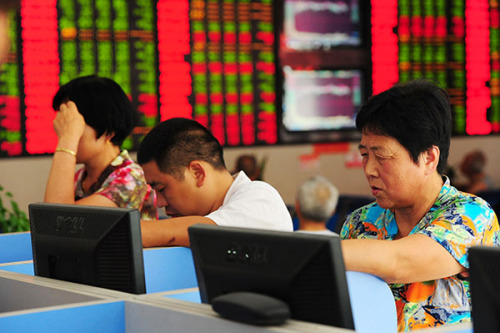
Investors at a brokerage in Fuyang, Anhui province. Between mid June and early July, the Shanghai Composite Index tumbled nearly 30 percent from its peak, prompting the government to take a series of rescue measures to stem the slide. (Photo/China Daily)
Fluctuations expose risks during crisis, and the price paid for rescuing the market is impossible to ignore
For investors, the stock market turmoil has been a terrifying experience. But when you look at the broader picture, the crisis has offered a unique learning opportunity for the financial regulator and the industry as a whole.
From mid June to early July, the Shanghai Composite Index tumbled nearly 30 percent from its highest point, wiping off nearly $3 trillion in the value of shares. Government initiatives have since stemmed the slide, but the market is still prone to violent swings.
The market fluctuations have hit China's financial system while the price paid for rescuing the market is impossible to ignore. Already there are doubts being expressed about the pace of financial reforms. Those doubts need to be dispelled.
It is crucial that they continue as China looks for new engines to drive its economic growth. Emerging industries, the service sector and private businesses are playing an increasingly important role in this process.
They demand financial services that can no longer be provided by the old system, dominated by big banks. Reform, therefore, is necessary during China's economic transition.
As the country pushes its Belt and Road Initiative to revive the ancient Silk Road, China will inevitably become more integrated into the global economy.
The yuan will play a greater role on the currency markets, while the newly formed Asian Infrastructure Investment Bank will continue to raise China's financial profile. Coupled with this, international capital and institutions are expected to play a bigger part in the Chinese markets.
Yet all this is only possible through financial reform. In fact, it is only by going down this road that China will be able to further open up and increase its global influence.
So far, this policy has proved extremely successful. The rapid development of wealth management products has enabled depositors to earn higher investment returns.
The launch of online share transfer platforms for unlisted startups has increased the funding options for small businesses that were excluded from capital markets.
Financial institutions have also strengthened their capital base and improved their business capabilities. But then, an arrow does not return once it is shot from a bow. That is why ending the financial reform policy is not an option for China. The risks exposed during the market crisis suggest that the financial system still needs to be improved.
Unless the problems are fixed, the country's financial stability will continue to be threatened.
Making sure there is a smooth transition when it comes to bringing in reforms will be crucial. During the stock market meltdown, three points emerged.
First, regulators need to be fully aware of any potential conflicts and risks in the process of financial reform.
One unique characteristic about the Chinese capital market is that government planning and market mechanism often interact with one another-forming a more complicated pattern.
In the end, reform is a process of fixing problems as you cannot expect the market to solve them all.
The second point is that there should be a top-down approach. To achieve this, certain prerequisites have to be met. For example, it is difficult to alter the speculative nature of the stock market without a registration-based scheme for new share sales.
Introducing trading, using borrowed money, in a speculative market will simply increase the risks and fuel bubbles. And we know what happens to them ... they burst.
Market volatility has also underscored the vulnerability of the domestic financial system. Liberalizing the capital markets prematurely will leave the economy open to speculative international funds. Therefore, financial reforms should be carefully designed and carried out in an orderly manner to ensure success.
Finally, the third point is that the financial regulatory system needs to keep pace with the evolving market. Activities in different sectors of the Chinese financial system are becoming increasingly intertwined.
Supervision carried out by different regulators can only cover a limited area of the entire system. This in turn has created regulatory blind spots and loopholes that magnify financial risks.
To combat this dual threat, China needs to establish a mixed regulatory system as soon as possible.
The author Xu Gao is the chief economist at Everbright Securities Co Ltd.


















































